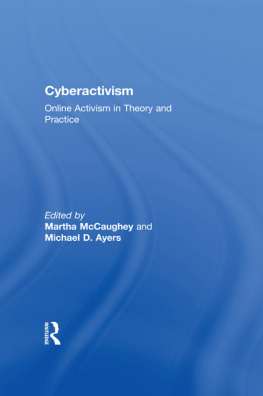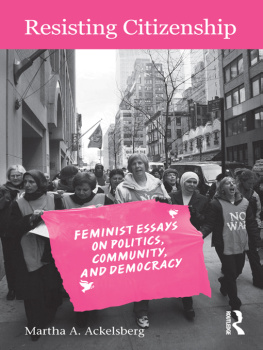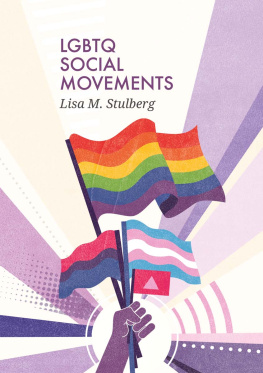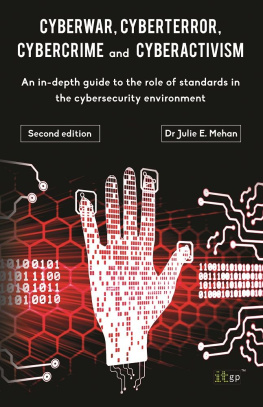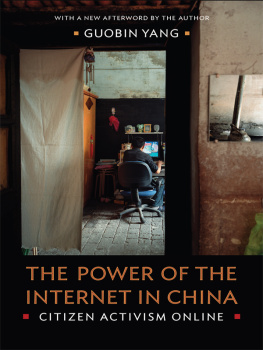Cyberactivism
Published in 2003 by
Routledge
711 Third Avenue
New York, NY 10017
www.routledge-ny.com
Published in Great Britain by
Routledge
2 Park Square, Milton Park
Abingdon, Oxon OX14 4RN
www.routledge.co.uk
Copyright 2003 by Taylor & Francis Books, Inc.
Routledge is an imprint of the Taylor & Francis Group.
All rights reserved. No part of this book may be reprinted or reproduced or utilized in any form or by any electronic, mechanical, or other means, now known or hereafter invented, including photocopying and recording, or in any information storage or retrieval system, without permission in writing from the publisher.
10 9 8 7 6 5 4 3 2 1
Library of Congress Cataloging-in-Publication Data
Cyberactivism : online activism in theory and practice / edited by Martha McCaughey and
Michael D. Ayers.
p. cm.
Includes bibliographical references and index.
ISBN 0415943191 (alk. paper) ISBN 0415943205 (pbk. : alk. paper)
1. InternetSocial aspects. 2. InternetPolitical aspects. 3. Social movements.
4. Protest movements. 5. Social action. I. McCaughey, Martha, 1966 II. Ayers, Michael D.
HM851 .C93 2003
303.4833dc21
2002031834
Contents
Acknowledgments
Martha McCaughey and Michael D. Ayers
Laura J. Gurak and John Logie
Dorothy Kidd
Sandor Vegh
4. The Radicalization of Zeke Spier: How the Internet Contributes to Civic Engagement and New Forms of Social Capital
Larry Elin
Lee Salter
Michael D. Ayers
Maria Garrido and Alexander Halavais
Wyatt Galusky
Joanne Lebert
Steven McLaine
11. Gay Media, Inc.: Media Structures, the New Gay Conglomerates, and Collective Sexual Identities
Joshua Gamson
David Silver
Acknowledgments
We wish to thank Matthew Byrnie at Routledge, Megan Boler at Virginia Tech, Richard Widick at UCSB, and Christina French, all of whom offered helpful feedback on this project. Thanks especially to David Silver for his unending enthusiasm for cyberculture studies and his support for this project specifically.
Introduction
Martha McCaughey and Michael D. Ayers
The increasing commercialization of the Internet demands a scholarly and political response. A huge portion of the books about the Internet published in the last three years claim to teach how to make money using it. Harder to notice but important to explore is the presence of political activism on the Internet, which we are calling cyberactivism. Amidst the publication of The Neatest Little Guide to Making Money Online and Starting an Online Business for Dummies , small and large networks of wired activists have been creating online petitions, developing public awareness Web sites connected to traditional political organizations (e.g., Amnesty International online), building spoof sites that make political points (such as worldbunk.org), creating online sites that support and propel real-life (RL) protest (e.g., a16.org, which stands for April 16, the date of the World Trade Organization [WTO] protest in Washington, DC), designing Web sites to offer citizens information about toxic waste, and creating online organizations (e.g., Indymedia.org) that have expanded to do traditional RL activities. Activists have not only incorporated the Internet into their repertoire but also, as this volume shows, have changed substantially what counts as activism, what counts as community, collective identity, democratic space, and political strategy. And online activists challenge us to think about how cyberspace is meant to be used.
We assembled Cyberactivism to document and discuss these significant political efforts. We did so not because we think the Internet is the latest technology for reaching the American Dream. Neither we nor the contributors to this volume are technological utopians or dystopians. At the same time, all share a modest belief that new technologies can become agents of progressive social change. If the Internet can assist people seeking progressive social change, it will do so not as an inevitability, nor as a cause, but rather as a means of change alongside other forces. This book documents the struggles of those activists and intellectuals interested in the use of Internet technologies for a democratic politics.
Cyberactivism crosses disciplines, mixes theories with practical activist approaches, and represents a broad range of online activist strategies, from online awareness campaigns to Internet-transmitted laser-projected messaging. The essays in this collection highlight the importance of current social-movement theory, cultural studies, media studies, and cyberculture studies to explore how cyberactivism helps, hinders, and transforms social-change work. The contributors to Cyberactivism explore the tensions between commerce and community, information and empowerment, awareness and action, identity and change, democracy and delinquency, privacy and piracy, cyberprotest and security breaches, online bodies and meat bodies.
The interdisciplinary field of cyberculture studies offers many helpful starting points for this study of online activism. Brenda Danets Cyberpl@y: Communicating Online (2001) shows how the Internet is transforming writing, performance, and art. Nancy Bayms study Tune In, Log Out: Soaps, Fandom and On-line Community (1999) and Sherry Turkles Life on the Screen (1997) investigate identity and community on the Internet, but not as part of a political movement. The compelling edited collections Race in Cyberspace (Kolko, Nakamura, and Rodman 2000) and Technicolor (Nelson, Tu, and Hines 2001) show us the many forms of racism that continue in this new communications medium. Cyberactivism highlights the activism in this medium to challenge such injustices.
While the Religious Right, the Ku Klux Klan (KKK), and other radically conservative political organizations have also colonized cyberspace in hopes of achieving their goals (see, e.g., Tara McPhersons study of U.S. Southern nationalists [or neo-Confederates] online in Kolko, Nakamura, and Rodman 2000 and Susan Zickmunds study of radical white supremacists in Jones 1997), we chose topics that focus on social-change efforts that could loosely be called progressive or anti-establishment. Under this category we include single-incident or single-campaign political actions by substate actors known as hacktivism, but not hacking into databases to steal credit card numbers or the online actions by one governments military of breaking into another military computer system, sometimes referred to as cyberwar, cyberattack, or cyberterrorism. Attempting to understand political movements online urges the field of cyberculture studies to shift, as McPherson (2000, 12) noted, from a focus on play, mulitiplicity, rhetoric, and theater toward explorations of struggles, citizens, politics, and publics.
Previous studies in the field have taken advantage of the easy access the Web provides a university researcherso, for example, a left-wing scholar who wouldnt get into a KKK meeting or rally can lurk in an online discussion list and record the postings. While such studies offer insights into the political sentiments of specific groups, this volume moves beyond documenting political views and asks how the Internet as an interface affects political sentiment, organizing, and social-movement theory. In other words, previous studies, while helpful for many reasons, have not studied online activism qua activism or qua cyberculture.
Understanding cyberactivism is important not only for scholars in cyberculture studies but also for scholars interested in activism, social transformation, and technology. Online activism raises new questions about political organizing and social change. Along with documenting new forms of activism enabled by the Internet, this volume engages social-movement theories about organizational structures, collective identity, leadership, and the framing of political issues. This book forms an interdisciplinary collection with critical examinations of a wide range of movements.

